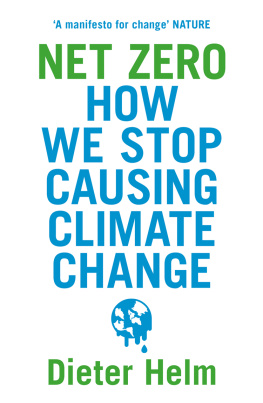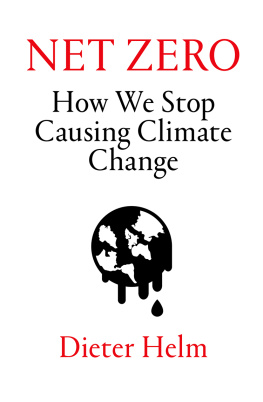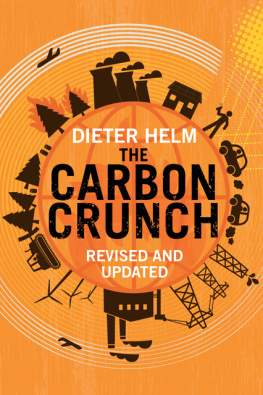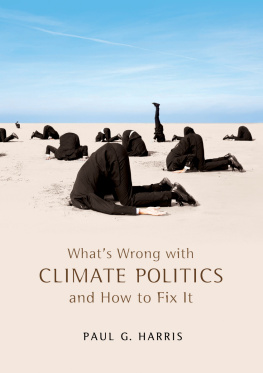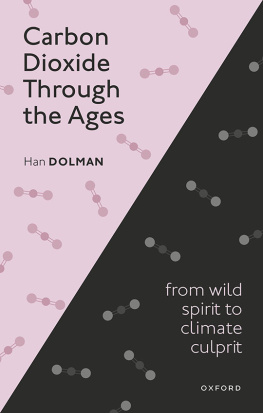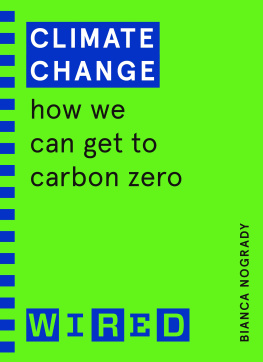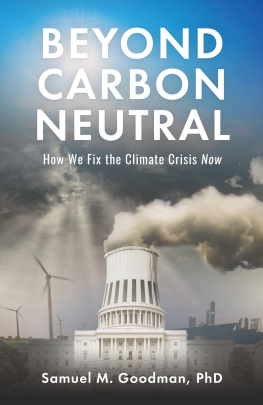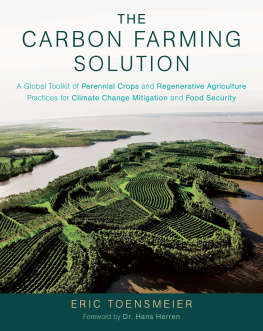CONTENTS
Contents
Guide
NET ZERO
HOW WE STOP CAUSING CLIMATE CHANGE
Dieter Helm

William Collins
An imprint of HarperCollinsPublishers
1 London Bridge Street
London SE1 9GF
WilliamCollinsBooks.com
This eBook first published in Great Britain by William Collins in 2020
Copyright Dieter Helm 2020
Cover illustration Shutterstock
Dieter Helm asserts the moral right to be identified as the author of this work.
A catalogue record for this book is available from the British Library.
All rights reserved under International and Pan-American Copyright Conventions. By payment of the required fees, you have been granted the non-exclusive, non-transferable right to access and read the text of this e-book on-screen. No part of this text may be reproduced, transmitted, down-loaded, decompiled, reverse engineered, or stored in or introduced into any information storage and retrieval system, in any form or by any means, whether electronic or mechanical, now known or hereinafter invented, without the express written permission of HarperCollins.
Source ISBN: 9780008404499
Ebook Edition September 2020 ISBN: 9780008404475
Version: 2021-08-16
Clearly written, on an important subject, by someone who knows their stuff Mark Avery
You should read it Julian Glover, Evening Standard
Dieter Helm is one of Britains foremost experts on energy economics and he has written a terrific book on the next agenda item once the COVID emergency has passed A fine overview of our climate policy failures and the options for doing better Colm McCarthy, Sunday Independent
Praise for Dieter Helms Green and Prosperous Land
One of the most important books of the decade Country Life
Refreshingly straightforward A pure economic argument for conservation Sunday Times
This is an important analysis, argued with passion, intelligence and rigour. It is timely too, because as Helm makes compellingly clear of the urgency of the problem Financial Times
A trenchant manifesto for change Nature
Delivers handsomely on the promise of its title New Scientist
A brave and forthright attempt to begin a new conversation British Wildlife
To Susie, Oliver, Laura, Amelie and Jake
I thought I had finished writing about climate change a while ago, with my two books on the subject The Carbon Crunch: How Were Getting Climate Change Wrong And How to Fix It and Burn Out: The Endgame for Fossil Fuels and The Cost of Energy Review (the Helm Review) I undertook for the UK government in 2017.
Back in 2012, in The Carbon Crunch I asked the question: why has so little been achieved? I wanted to puncture the complacency, and especially the peak oil fantasy that we were going to run out of fossil fuels, and hence the oil price was heading north, making what looked like expensive renewables cheap by comparison. I followed this up in 2017 with Burn Out, pointing out that we have enough oil and gas to fry the planet many times over, and that the exit from fossil fuels will be messy for the great oil-producing countries, and messy for the renewables, as the trend price of oil and gas falls back. In both books, I stressed that a big part of the answer lay with technical progress and new technologies, and suggested that current renewables technologies would not be enough to solve the problem whatever their initial contributions, and they would not be in the money any time soon.
And so it has come to pass. The predictions of the peak-oilers have turned out to be nonsense, the price of oil (and gas) has fallen back and, whatever their advocates claim, renewables are not yet subsidy-free once all the costs have been taken into account.
What I had not anticipated was that no serious progress would yet have been made on the fundamental problem, and that the concentration of carbon in the atmosphere would still just keep on going ever upwards, without so much as a blip, and, if anything, slightly accelerate. Even the Covid-19 coronavirus pandemic has failed to puncture the rise in the concentration of carbon in the atmosphere, even if it has made a temporary dent in emissions. When set against the enormity of the consequences of climate change, the only rational response is anger.
If this failure to achieve anything much in the last 30 years had been the consequence of not trying, it would be bad but at least understandable. But this is not the case: a huge amount of political capital and money has been spent in the name of mitigating climate change. Many people have been led to believe that current policies are working and that we are making good progress. They are not and we are not.
It is hard to stand on the sidelines and watch the results of badly designed policies and the misleading of people whose goodwill in the face of the wall of costs they will have to pay is essential to making progress.
What really bothers me, and makes me pick up the pen again to write on climate change, is the widely repeated claim made by the UKs Climate Change Committee (CCC) in the foreword to its recent report Net Zero: The UKs Contribution to Stopping Global Warming:
By reducing emissions produced in the UK to zero, we also end our contribution to rising global temperatures.
This is misleading in that the net zero target the CCC advocates is for territorial emissions in the UK, and unless every other country we trade with gets to net zero by 2050 too, or we stop importing carbon-intensive goods, it is simply not true. Neither contribution is likely to be met, COP26 notwithstanding. The net zero carbon production target takes no account of the carbon we import, and which pervades much of our spending. For a deindustrialised economy with only 20 per cent manufacturing, this is particularly pertinent. To give a simple example, if British Steel had closed down (something which was under active consideration at the time the CCC published its report), UK territorial emissions would have gone down, but the subsequent increased imports of steel from, say, China would mean global warming would go up, and by more than it would have had that steel manufacturing remained here. According to the CCCs logic, why not close the rest of the British car industry, and INEOSs Grangemouth petrochemical plant too?
Buried later in the CCC report () is a chart showing the real villain of the piece, carbon consumption, stated as some 70 per cent higher than carbon production (albeit both badly measured and incomplete). If the UK wants to make no further unilateral contribution to global warming, which as I shall argue it should, then it is the altogether harder net zero carbon consumption that matters, and not just the easier bit of net zero carbon production.
It is also misleading because net zero does not actually mean reducing emissions to zero in the UK. It is not gross zero but net zero. Net zero means that natural and industrial sequestration must be equal to or greater than the remaining carbon emissions in 2050, of which there are still likely to be quite a lot under even the most optimistic scenarios.
The public are being misled, and the CCCs formulation has the neat consequence that it makes the climate change problem look like it is all about production (and therefore all about what business does), and not about our personal spending. Having set up this illusion, the CCC effectively admits this later on, suggesting that we will have to eat less meat, change the land cover by planting lots of trees, and alter our lifestyles quite a lot. Here it is on stronger ground, although, as we shall see, not by any means strong enough.

